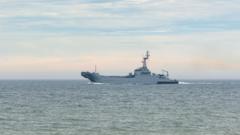NATO has rolled out a new operation called "Baltic Sentry" aimed at enhancing the surveillance of maritime activities in the Baltic Sea, an initiative prompted by the recent severing and damage of vital undersea cables. This announcement was made by NATO Secretary General Mark Rutte during a summit in Helsinki that gathered representatives from all NATO countries bordering the Baltic Sea, including Finland, Estonia, Denmark, Germany, Latvia, Lithuania, Poland, and Sweden.
While Rutte did not explicitly place blame on Russia regarding the undersea cable damage, he emphasized the necessity for tightened monitoring of what he termed Moscow’s “shadow fleet,” a reference to types of vessels reportedly operating without clear ownership status, primarily engaged in transporting prohibited oil products. The relationship between NATO nations and Russia has soured significantly, especially since Russia’s full-scale invasion of Ukraine in February 2022. Rutte expressed grave concern over the security of infrastructure, advocating a robust NATO response to potential threats, including boarding and the confiscation of suspicious ships.
The specifics of the forces involved in the Baltic Sentry initiative remain under wraps, as Rutte stated that the number and type of assets may fluctuate. He aimed to keep operational details obscure to avoid giving any advantage to potential adversaries. The significance of undersea infrastructure was highlighted by Rutte, noting that these cables are critical not only for electricity distribution but also for facilitating over 95% of global internet traffic, supporting financial transactions worth an estimated $10 trillion daily.
Recent months have seen an increase in unexplained incidents affecting undersea infrastructure in the Baltic region. In December, an electrical cable connecting Finland and Estonia was cut, leading to a confrontation involving the Finnish Coast Guard and the oil tanker Eagle S, at risk of damaging additional power and gas pipelines in the area. Estonia’s Foreign Minister Margus Tsahkna remarked on the troubling frequency of such incidents, suggesting a likelihood of deliberate action rather than mere accidents or poor navigation.
Further reinforcing this sentiment, Sweden's Prime Minister Ulf Kristersson noted the persistent strange occurrences in the Baltic Sea while remaining cautious against jumping to conclusions without substantial evidence. The ongoing situation illustrates a growing unease among Baltic nations regarding potential hostile actions relating to undersea infrastructure.
While Rutte did not explicitly place blame on Russia regarding the undersea cable damage, he emphasized the necessity for tightened monitoring of what he termed Moscow’s “shadow fleet,” a reference to types of vessels reportedly operating without clear ownership status, primarily engaged in transporting prohibited oil products. The relationship between NATO nations and Russia has soured significantly, especially since Russia’s full-scale invasion of Ukraine in February 2022. Rutte expressed grave concern over the security of infrastructure, advocating a robust NATO response to potential threats, including boarding and the confiscation of suspicious ships.
The specifics of the forces involved in the Baltic Sentry initiative remain under wraps, as Rutte stated that the number and type of assets may fluctuate. He aimed to keep operational details obscure to avoid giving any advantage to potential adversaries. The significance of undersea infrastructure was highlighted by Rutte, noting that these cables are critical not only for electricity distribution but also for facilitating over 95% of global internet traffic, supporting financial transactions worth an estimated $10 trillion daily.
Recent months have seen an increase in unexplained incidents affecting undersea infrastructure in the Baltic region. In December, an electrical cable connecting Finland and Estonia was cut, leading to a confrontation involving the Finnish Coast Guard and the oil tanker Eagle S, at risk of damaging additional power and gas pipelines in the area. Estonia’s Foreign Minister Margus Tsahkna remarked on the troubling frequency of such incidents, suggesting a likelihood of deliberate action rather than mere accidents or poor navigation.
Further reinforcing this sentiment, Sweden's Prime Minister Ulf Kristersson noted the persistent strange occurrences in the Baltic Sea while remaining cautious against jumping to conclusions without substantial evidence. The ongoing situation illustrates a growing unease among Baltic nations regarding potential hostile actions relating to undersea infrastructure.


















